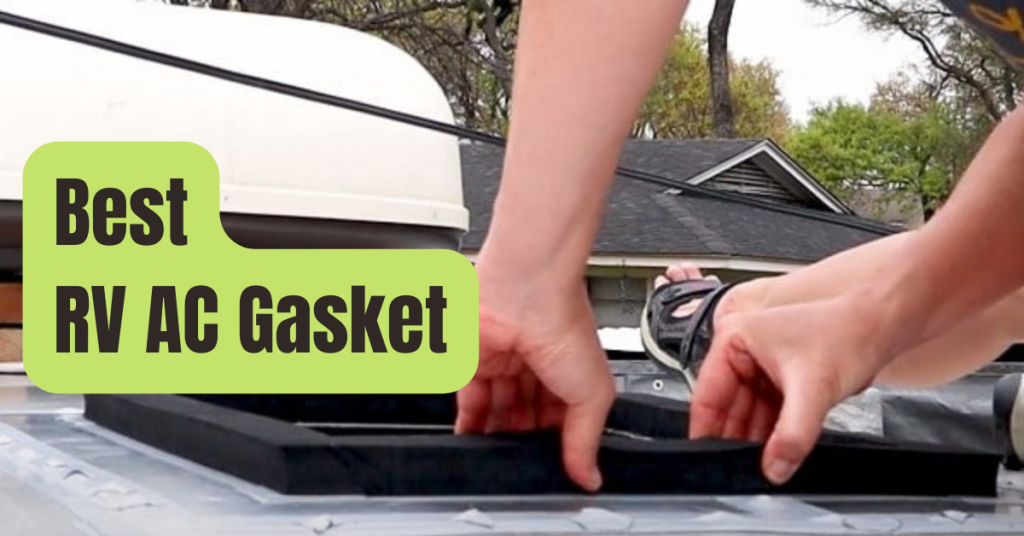The majority of seasoned RV travelers will tell you that air conditioning is a must-have.
You won’t get a decent night’s sleep without a fully operating rooftop RV Air Conditioner unless you’re going in the mountains or camping in the winter.
Unfortunately, it’s all too easy to overlook RV rooftop air conditioners. Right up until you run across a difficulty.
If the temperature in your RV is rising and you’re in a pinch, or just trying to be proactive about the situation, you may be asking what you can do if the air compressor in your RV isn’t turning on.
Fortunately, you may be able to identify and fix a few common RV rooftop air conditioner issues yourself. However, there are a select handful that need the assistance of a skilled specialist.
This tutorial will help you assess if you can repair a problem with your RV’s rooftop air conditioner yourself or whether you need to hire an air conditioner technician.
What Are Some Symptoms Of An RV Air Conditioner Issue?
Some RV air conditioners may offer you warning indications that a problem is on the way. Though there are occasions when they seem to die for no apparent reason.
When the fan runs yet warm air comes out, it’s typically because the thermostat has recognized that the temperature in the RV is increasing and has set the system to function normally. The fan continues to function, but there is no true heat exchange since the compressor isn’t moving freon.
The RV Air Conditioner Doesn’t Work – This might indicate a thermostat issue or a blown circuit breaker, causing the whole system to malfunction. A simple dead battery in the RV’s thermostat control might sometimes be the cause of the system’s failure to fire.
The Air Flow Is Weak and the Air Coming Out Is Stale – This might indicate a number of issues. It’s possible that the RV air conditioner is low on freon or that the RV air filter is severely blocked.
Read more: RV Air Conditioner Leaks When It Rains: What Causes It And How To Fix It
What Is the Function of an RV Air Conditioner Compressor?
It helps to have a basic understanding of how an RV air conditioning system works in order to detect an issue with it.
The air conditioning system in most RVs shares several components with the heating system.
The compressor and the fan are the two major components of an RV rooftop air conditioner. The RV’s onboard 12-Volt electricity powers the compressor.
It circulates a compressed refrigerant, commonly Freon, via a series of coils and unique cooling fins.
Inside the RV, this effectively exchanges the heat and humidity. The RV air conditioner’s compressor, however, depends on the fan to successfully blow the cold air throughout the RV.
Read more: What To Do If Your RV’s Air Conditioner Isn’t Blowing Cold
The thermostat controls the complete air conditioning system. It monitors the temperature and activates the system when the temperature within the RV reaches the predetermined value.
The thermostat then controls the compressor and fan, turning them on and off as needed. One or more capacitors are used in most RV thermostats.
They may also be powered by a battery or the RV’s onboard 12-volt electrical system.
The Air Conditioner Compressor in My RV Won’t Start
The thermostat indicating that the system is functioning and the fan is working, but only warm, stale air is coming out is one of the most prevalent indicators of an RV air conditioner compressor failure.
The capacitors in the RV air conditioner compressor are one of the first things to look for in a scenario like this.
It’s conceivable that one or more of them have been overwhelmed and blown.
This stops the electricity from completing the circuit and hence the compressor motor of the air conditioner from turning on.
The Signs Of A Faulty AC Compressor Capacitor
A faulty RV air conditioner capacitor might cause the following symptoms. Some of these are easy to recognize ahead of time, while others are more difficult.
- The air conditioner hums as it tries but fails to start.
- The air conditioner operates for a few minutes before turning off, but no circuit breaker is tripped.
- To get the fan blades moving, give them a little push.
- Although the air conditioner blasts warm, stale air, the compressor is broken.
What Is The Purpose Of An Air Conditioner Capacitor?
Capacitors are all intended to hold a tiny quantity of electric charge in order to assist in the acceleration of more powerful devices.
Both the compressor and the fan motor in an RV air conditioner system depend on capacitors to get them started.
A defective capacitor may sometimes burst without causing any further damage to the RV’s air conditioning system.
This is more likely to happen if your RV has been sitting idle for an extended length of time.
A capacitor loos like a little battery or button if you can open a panel to expose the internal innards of your RV’s air conditioner system, and on a bigger unit, you could see many ones throughout the system.
How Does A Faulty Air Conditioner Capacitor Appear?
Let’s pretend you can get into the electrical innards of your RV’s air conditioning system to look for a faulty capacitor.
Occasionally, noticeable black markings or a plainly damaged component will indicate a burned-out capacitor.
There are situations, though, when an internal problem in a capacitor isn’t visible.
If you don’t notice any quick visible indicators of a damaged capacitor but suspect one, use a multimeter to examine the suspected bad capacitor.
This is done by touching the probes to the prongs of a good capacitor. When you do, a value will appear on the screen that will steadily drop over time. When the capacitor is faulty, this does not happen.
You’ll need to search for the little model number written on the side or top of the capacitor to replace it.
Then it’s only a question of loosening and removing the old one with a soldering iron, then gently replacing it with the exact replacement and two very little dobs of melted electrical solder.
Checking Other Air Conditioning Compressor Components in Your RV
While issues with air conditioner system capacitors are the most typical cause of compressor failure, they aren’t the only item to look at.
Check the Start Relays on the Air Conditioner
Sometimes start relays fail, stopping the compressor from firing. It’s possible that you’ll detect indicators of burnout or a loose relay.
On sometimes, burns, smudges, or debris might accumulate on the connectors, preventing the electricity from passing.
When this occurs, the start relay is unable to activate the compressor. If you live near a well-stocked auto parts shop, this is a pretty inexpensive remedy.
You may easily remove the relay and transport it. It will have the identifying numbers printed on it.
Check the fuse panel or the circuit breaker.
A circuit breaker or a fuse might trip or burn out and seem to be functioning normally.
Then, upon closer inspection, it becomes evident that the trigger has been switched or that the fuse has blown.
This little flaw might prevent required electricity from reaching the compressor of the air conditioner.
Valves that have been compromised
The performance of an RV air conditioner compressor might be harmed by broken or jammed valves.
When this occurs, the refrigerant arrives as a liquid rather than a gas at the compressor input.
This is one of those situations when you’re not sure if you can repair it yourself or whether you need to hire an expert.
Examine Your Air Conditioner’s Filter
In the air return of many RV air conditioner systems, there is an air filter. If you haven’t cleaned it in a long time, or ever, there may not be enough airflow returning to the system.
If the filter is reusable, try changing it or completely cleaning it. Then, to connect the RV’s air conditioner system to the onboard 12-volt electricity, reset the circuit breaker.
How Do You Know If Your Compressor Is Broken?
If you’ve examined the capacitors, starter relays, and filters, it’s likely that the problem is with the compressor itself.
This might be a burned-out bearing or some mechanical breakdown beyond your control.
This is generally when you should seek the help of a professional technician to identify the problem.
Especially if the compressor is very hot, emits smoke, or displays symptoms of burn damage on the outside. This is frequently an indicator of a serious internal mechanical problem.
Read more: How Long Can You Run an RV Air Conditioner?
Most Commonly Asked Questions
Can The RV AC Compressor Fail Due To Low Refrigerant Levels?
Yes, an RV AC system that is low on refrigerant or out of refrigerant will not create cold air.
Though this isn’t normally something that comes out of nowhere and takes you off guard.
A low-refrigerant RV air conditioning system will often operate poorly and worse over the period of weeks or even months.
Is it possible to just use the motorhome’s air conditioning to keep the RV inside cool?
While the dash AC in the motorhome may keep you comfortable while driving down the road, it will most likely not be enough to keep the whole RV cool over the course of a long day or a hot night.
Not to mention the fact that the motorhome’s engine would have to be left running all night.
You may be able to get away with it in a hurry if you strategically install a fan or two, but it’s not a long-term solution for an RV air conditioner compressor issue.
Conclusion
Air conditioner compressor issues in RVs are a real pain, and you don’t want them to spoil your trip.
While regular maintenance will assist, there will be instances when your RV’s rooftop air conditioner may break down.
Having a multi-meter and some other simple equipment aboard your RV, such as a soldering iron, can go a long way toward diagnosing and maybe even correcting a problem.
Start by looking for indicators of a problem with the fuse or circuit breaker. Then take a close check at the filters and the thermostat.
These are basic, non-obtrusive items that are simple to remove. The capacitors and start relays may next be checked to see if they display any evident indicators of a defect.
With a little luck, you’ll be able to repair the air conditioner compressor in your RV without having to pay a hefty mechanic charge.













